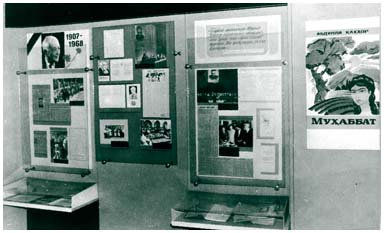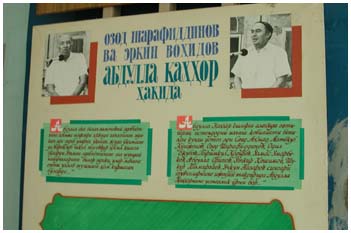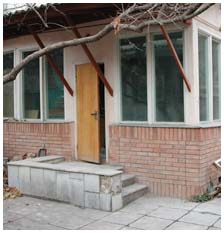The Abdulla Kahhar home-museum was organized in the two-storey private residence, where this outstanding writer has lived during the last ten years of his life since 1958 till 1968.
The personality of Abdulla Kahhar occupied a special place in the modern Uzbek culture. Such genres as comedy and short story writing which brought the author fame as a satirist got development and reached height in his creative work. Glory is known to bring an artist not only laurels but also satiated his life with problems which don't leave him even after his death. The opinion exists that Sharaf Rashidov who led Soviet Uzbekistan as the first Seretary of the Communist Party of Uzbekistan and striving for fame himself, ardently treated Kahhar's creative work even after his death. This is probably the reason of the fact that the volume of recollections and articles on literary criticism "Abdulla Kahhar and his artistic nature" saw light only in 1987. Evidently for the same reason the museum consisting only of 2 rooms opened only on May 6, 1987 - that is more than 20 years later after his death despite of world-wide fame of Kahhar's personality. Since 1992 an exposition occupied the whole building of the two-storey private residence.

The exhibits of the four halls of the museum describe life and creative path of the writer. Abdulla was born on September 17, 1907 in the kishlak of Asht in Ferghana Valley in the family of a blacksmith, which often moved from one place to the other. At the beginning of the 20-s he studied at Kokand Pedagogical College and began publishing his writings in "Mishtum" ("Fist") magazine. In the middle of 20s he studied at the worker's faculty of Middleasian State University and at the end of the same years he worked as a responsible Secretary of the newspaper "Yangi Farghona" (New Ferghana) and in the department of humour "Chighirik" he published more than 20 satire topical works during 3 months.

In the 30s and 40s Kahhar wrote a novel "Mirage" and translated the narrative "Captain's Dauther" by Pushkin, the comedy "An Inspector" by Gogol, the novel "War and Peace" by Leo Tolstoy, the writings by Emil Zolya and some other Russian and foreign classics of literature. There is a curious fact - for his novel "Mirage" Kahhar was awarded a trip through Central Russia from which he brought a 22 volumes collection of writings by Chekhov. After studying his skill and adopting his innovations Kahhar rightfully received the title of "Uzbek Chekhov" for his distinct mastering of word and his strained laconic.
In the 50s - the items of the third hall reflect this period - creative activity of Kahhar reached the top. His comedy "Silky Suzane" was awarded a Stalin prize in 1952, his work were performed at the theatres of Moscow, Leningrad and other cities and were translated into some languages of the peoples of the USSR as well as Rumanian and Chinese.
In the 60s his narrative "Ptichka-nevelichka", autobiographical book "Tales of by gone days" and a lyric comedy "My Dear Mummies" created shortly before writer's death, won wide popularity. Abdulla Kahhar died on May 25, 1968. A number of modern Uzbek writers including Said Akhmad, Utkur Khashimov, Aerkin Vakhidov consider Kahhar to be their tutor.

The reconstruction of the museum has just been started. After it being completed the museum will open its doors again.
The keeper-in-chief and the executive curator of the museum is Nodira Djalalova.
Main page

|

|